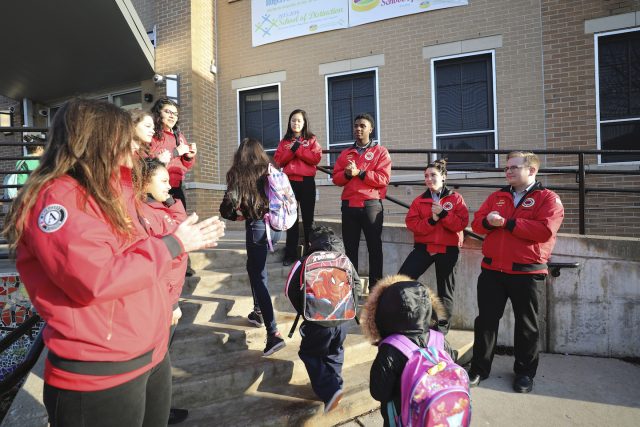Why we don’t use the term “learning loss”
Why we don’t use the term “learning loss”
Learning loss. If you’ve turned on the news, you’ve undoubtedly come across this phrase. As the world recovers from the pandemic, and schools across the United States begin planning for a safe transition back to in-person learning, the conversation inevitably turns to how we can recover from all disruptions that students and teachers experienced during the COVID-19 pandemic—including falling behind in key subject areas.
As an organization that’s trying to shift to more asset-based language and better honor and celebrate the students and schools we serve, City Year is avoiding the term “learning loss.” Here’s why.

Learning loss operates from a deficit perspective
The phrase itself implies that students didn’t learn anything at all once schools were closed in March 2020. Worse yet, it implies that not only did students not learn anything, they didn’t retain information they previously learned.
While no one would dispute that the most students have experienced interrupted learning, among other disruptions, we believe it’s more accurate to say that student learning trajectories have shifted over the past 16 months. Students didn’t stop learning and developing—but their learning experiences and environments were far different than anyone could have anticipated before the pandemic hit. The losses they experienced were losses of access to their school community, to consistency and routine, to stable learning environments.
But students honed other skills, including flexibility, resilience and creativity. They mastered online classrooms and chat boxes. They figured out how to access homework assignments and ask questions during distance learning. Some students discovered they liked online learning even more than in person instruction.
We recognize that for our students and families, the majority of whom are of color and live in low-income households, the pandemic has disproportionately affected their lives and livelihoods. This has been a time of loss on many levels: isolation, death, job loss, sustained economic insecurity, sickness, immigration status and frustrating limitations on their virtual learning access. They’ve endured anger and sorrow and fear of living Black and Brown and the fear and guilt of the rest of America as we’re forced to reckon with systemic injustices.
The last thing our students need is to be branded as a “lost generation,” at risk of absorbing a sense of hopelessness and defeat that could hold them back from future success far more than the interrupted schooling of the past 16 months or so.
“Learning loss” emphasizes academics over social-emotional well-being
A large and growing body of research—as well as years of our experience serving in classrooms across the country—finds that academic, social and emotional learning are, in fact, intertwined and interwoven, like strands of a rope. Learning happens in community, in particular contexts, and through relationships.
Our holistic services honor this integrated reality and seek to nurture the growth and development of the students we serve—academic, social and emotional.
When we think about the events we’ve all experienced since March 2020, the term “toxic stress” can help to describe the pain, loss of control and distrust that our students, teachers, principals and families having been living with. Our brains, our motivation and our physical and mental well-being all operate depending upon our circumstances. When we experience this stress and trauma, our brains freeze under the pressure.
How can we expect our students to focus on learning when their basic needs for love, joy and security are in turmoil?
During the pandemic, students’ learning trajectories have shifted and many students have experienced numerous interruptions and losses in their lives, even as they have also honed skills such as flexibility, resilience and creativity.
When schools transitioned to distance learning, there was no playbook for how to best support students. Despite this, teachers and other education practitioners, including City Year AmeriCorps members who serve as student success coaches, have risen to the challenge, finding creative ways to connect with students and adjusting their approaches to meet students’ expanded needs during this time.
So, what should we use instead of “learning loss”?
We’re inspired by thought leaders who challenge the dominant “learning loss” narrative, and instead are urging us to view students as the multi-dimensional people they are and not reduce learning to a narrow, inaccurate and inequitable view of success.
We are leaning into phrases like “interrupted learning” instead. This language seems to capture the uniqueness of the pandemic challenges students and schools are experiencing. It’s a little more asset-based while not glossing over the challenges of how we re-engage students and re-integrate them into their classroom environments as we recover and transition back to school.
Our schools and country face a choice right now. We can think of next year as a #backtoschool: the new “normal” moment, or we can choose to untie ourselves from the way things were by taking the best from the past and leaving the rest behind as we collaborate to build more equitable and engaging schools where all students can thrive.
COVID-19 offers us this opportunity. The pandemic threw all the school experience building blocks up in the air. Which ones we choose to catch and how we choose to combine them is the incredible moment.
Related stories
Over the last few months, City Year Memphis and their local Starbucks partners—along with several other community organizations, businesses and...
Read more about Creating hope and opportunity in Memphis through partnershipsIn recognition of Financial Literacy Month, City Year AmeriCorps members are exploring the importance of financial literacy for young people’s...
Read more about Understanding the importance of equitable access to financial literacyIf you speak with an HBCU alum about their experience, you’ll quickly learn that service to the community is one...
Read more about Diversity, leadership and community: reflections of an HBCU alumDo you know about the vibrant city of Kansas City and the incredible opportunities it offers to City Year AmeriCorps...
Read more about Seven reasons to serve with City Year Kansas City















